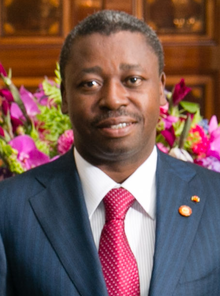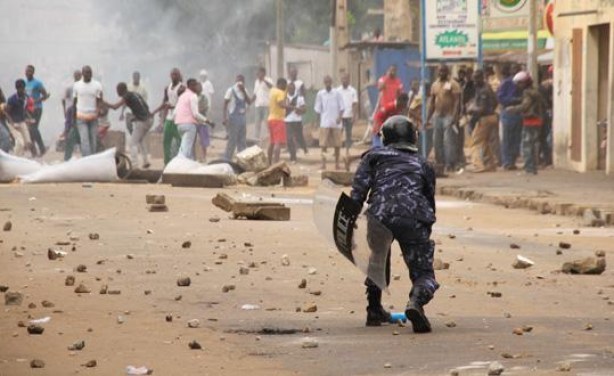Death Toll Mounts in Togolese Governmental Repression of Mass Demonstrations
Gnassingbe regime unleashes deadly force in effort to stall political reforms

Featured image: President Faure Gnassingbe
Four people were reportedly killed by security forces during demonstrations organized by opposition forces on October 18-19.
An alliance of 14 political parties and coalition groups openly defied attempts by the government of President Faure Gnassingbe to ban protests by going into to the streets to demand that the current regime resign in lieu of holding democratic elections.
The Gnassingbe family has been in power in the West African state since 1967. The regime is closely aligned with the former colonial power France and other Western states.
Among the dead in the recent wave of unrest included an 11-year-old child who was shot down by security forces in the capital of Lome. Demonstrations have also been held in the second largest city of Sokode where police attacked protesters during the recent period.
ECOWAS Role Compromised by Conflict of Interests
Regional leaders of the Economic Community of West African States (ECOWAS) have largely remained silent since the outbreak of demonstrations on August 19. However, the severity of the repression and the issuing of statements by France and the United States have prompted ECOWAS to call for dialogue between Gnassingbe and the opposition groups, a position echoed by Paris.
Complicating the role of ECOWAS is the reality that Gnassingbe currently holds the rotating chairpersonship of the regional grouping. Any expectation that the 16-member body with its current composition will take a forceful stand is counterintuitive.
In response to the demonstrations and general strikes, the government did pass legislation ostensibly designed to open up the political process. However, opposition leaders rejected the legislation that purportedly places limits on how many terms a president can stay in office because the measure was not retroactive. Therefore, Gnassingbe could still remain in office until 2025.
A constitution approved during mass unrest in the early 1990s has never been put into full effect and was ignored in the aftermath of the death of Gnassingbe Eyadema in 2005. Eyadema, the father of the current leader, was a French-trained military officer who came to power through a military coup fifty years ago.
Alassane Ouattara, another western-backed leader in neighboring Ivory Coast, claimed that he along with other leaders from Nigeria, Niger, and Ghana held talks with Togo’s president on October 24.
“We believe negotiations are needed … and that these negotiations must lead to constitutional modifications already embarked upon.” (Global News Network, Oct. 26)
The Ivorian leader who himself was installed in power by France in 2011 after the overthrow and kidnapping of former President Laurent Gbagbo and First Simone Gbagbo, said that the ECOWAS leaders eschewed violence noting it was “important there is a climate of peace in Togo”.
“Demonstrations must be able to occur but peacefully,” Ouattara said. He went on to declare that ECOWAS would not tolerate repressive violence and would respond with unspecified “rigorous measures”.
A French foreign ministry spokeswoman Agnes Romatet-Espagne on October 25 said that the government in Lome must “respect the right to protest. Protests should be expressed in a peaceful manner. We strongly condemn the recent violence that has left several people dead or injured (and) call for calm on both sides and dialogue. (Global News Network, Oct. 26)
In addition, the United States Department of State spokesperson Heather Nauert, issued a statement on behalf of the administration of President Donald Trump expressing concern about the escalating violence in the country. Security alerts by the Embassy of the U.S. have cautioned Americans living and working inside the country.
The State Department press release read in part:
“We are particularly troubled by reports of excessive use of force by security forces and reports that Government-sponsored vigilantes are using force and the threat of force to disrupt protests and intimidate civilians. The United States is also concerned with the Government of Togo’s decision to restrict demonstrations during the workweek and to arrest a prominent imam in the city of Sokode. We call on the Government of Togo to uphold its citizens’ human rights, notably their freedom of expression, peaceful assembly, and internet freedom and to ensure that all those arrested during demonstrations are afforded the right to due process.”
Opposition Forces Must Set the Course for Political Transformation
Despite these developments, it remains to be seen what actual measures the imperialist governments will take in regard to the current crisis. Obviously, the West and its allies in the region do not want a sweeping revolutionary transformation in Togo. Such a manifestation would have regional implications in light of the character of the current administrations holding power in neighboring Ghana and Ivory Coast.
With the ECOWAS leaders breaking their silence on the political crisis and the governments of France and the U.S. urging restraint may indicate pressure from regional and western powers for the opposition forces to compromise with the Gnassingbe administration. At present the Chair of the African Union (AU) heads-of-state summit is from West Africa in the personage of President Alpha Conde of Guinea.
Togo masses standoff with security forces (Source: Abayomi Azikiwe)
This provides a sense of urgency for the AU to politically intervene in the standoff between opposition parties and coalitions fighting to remove the incumbent regime. Conde revealed on October 27 that he had held talks with Ouattara over both the situation in Togo along with proposals under consideration for the establishment of a common currency among the ECOWAS member-states.
Conde has chimed in on the stalemate saying the Togolese government and opposition parties must discover a “peaceful” resolution to the struggle over a mechanism for a political transition considering the number of lives which have been lost over the last two months. However, what has compelled the mass demonstrations since August is the belief that the ruling party is incapable of reforming itself and therefore must be removed from power.
The AU Chair said of the discussions around economic issues and the Togo unrest:
“We have reviewed a series of questions, notably on the single currency. It’s a goal we have together. We also exchanged views on the situation in Togo. It is extremely important that things evolve peacefully in the country and there should be a solution that would allow the Togolese people to continue moving forward.”
Although Pan-African National Party (PNP) leader Tikpi Atchadam was quoted as saying:
“We believe that President Macron (of France) will intervene. We are waiting.”
Nevertheless, the character of the involvement by Paris is the central question. France’s foreign policy towards its former colonies has never been based upon the desire to empower the progressive forces.
Events in Ivory Coast since 2010 along with Gabon and the Central African Republic convey this axiom out in real terms. In Libya, where the conservative government of Nicolas Sarkozy joined in with the U.S., Britain, Italy and other imperialist nations in 2011 to destroy the sovereignty of the North African state of Libya, this most prosperous country has been rendered to abject poverty as well as a base for instability and human trafficking to Europe.
The PNP opposition party which has spearheaded the mass demonstrations and strikes over the previous months said of Conde that he “tried to meet us. He even sent his plane to get us and it was the day before our departure that the arrests (of opposition supporters) started.”
Meanwhile ECOWAS leaders, particularly in Ghana, are closely monitoring the influx of refugees fleeing the impact of the crackdown by Togolese security forces. The United Nations High Commissioner for Refugees (UNHCR) reported that approximately 500 Togolese nationals have arrived in neighboring Ghana.
A spokesperson for the refugee agency, Babar Baloch, pointed out that:
“Togolese seeking safety, including women and children, told UNHCR staff earlier this month that they had fled on foot, walking from their homes in Togo’s Mango region, bordering Ghana. They said they were fleeing human rights abuses after the recent political protests.” (VOA, Oct. 27)
Baloch continued saying:
“Togo’s neighboring countries are quite worried that if the situation is not resolved soon, maybe more people would flee. That is why they have approached the U.N. refugee agency to prepare themselves for any further refugee arrivals.”


